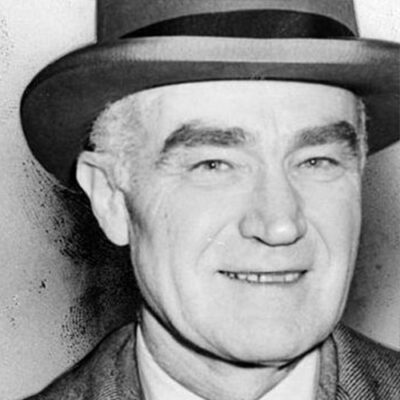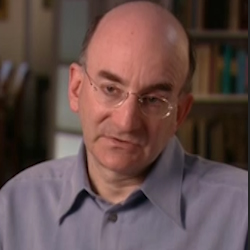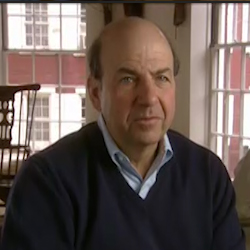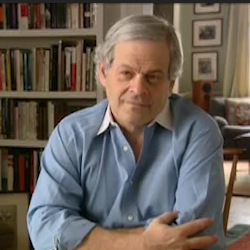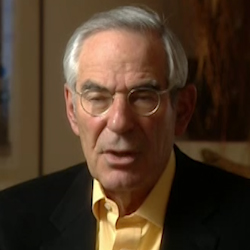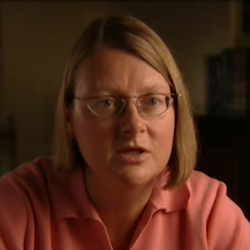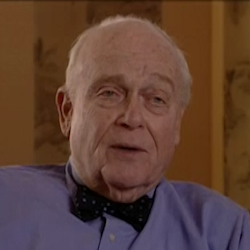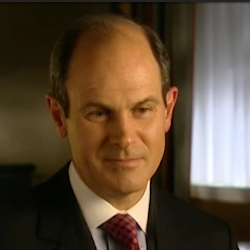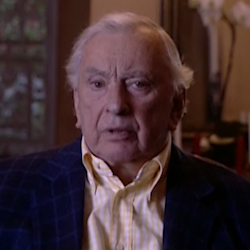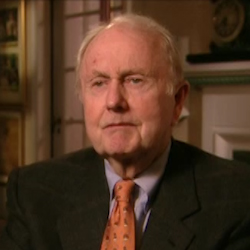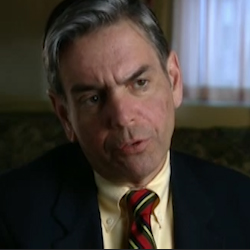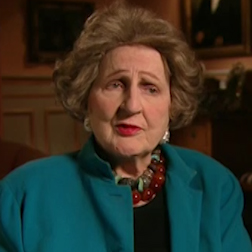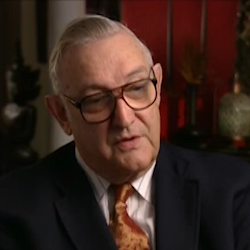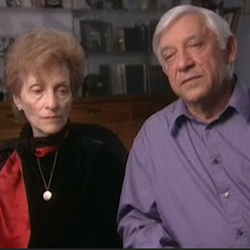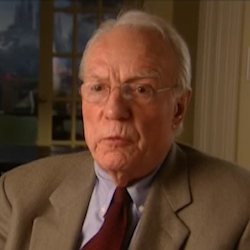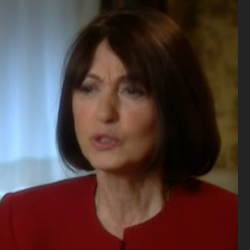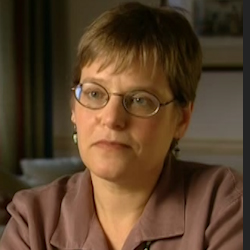Speaker Out loud enough. You’re perfect. Now they’re trying to get you. You don’t have to yell. They can’t.
Speaker They reckon they can it. OK, we’re done.
Speaker We’re speeding. Great. OK.
Speaker I just want to say that this is January twenty third and we are a foreigner in his home for. Lou, Henry Luce in the making of the American century.
Speaker Many of us started by accident apart, you know, sort of a personal historical question, which is when you first you were in St. Louis, went before you went to.
Speaker Yes, I was working on the Post-Dispatch.
Speaker Well, what was it like for you to anticipate going to work for Time magazine? What was its reputation in your field?
Speaker Well, I think its its reputation was good, except I think some newspaper journalists always thought the time was a little too short on stories to flip on some stories and things like that. But of course, I came there shortly after the start of the war and time got more and more serious. I first came there as a writer in what was then called the National Affairs Sections, or actually it was called United States at War. And I was a writer in that for the first couple of years that I was there.
Speaker But you.
Speaker So was this considered a step up or a step down for a serious child?
Speaker Well, it was it. Oh, no, I considered it a step up and I had several friends there who I never knew very well. Two of them had been on the Post-Dispatch with me, and I was very respectful of what they had done and questioned salary.
Speaker It was a big step up. I was making seventy five dollars a week. The Post-Dispatch and I went to time with one hundred twenty five dollars a week.
Speaker At that time, what what importance did. Looses magazines, time, particularly time in life, have been kind of the.
Speaker Public consciousness or the cultural landscape, if you will, of of, uh, of American life?
Speaker Oh, I think I think good time had.
Speaker A very respectful, very good reputation among especially among the more educated people in the country. And Time always knew that that’s where its growing audience lay that among college graduates and educated people.
Speaker Life, of course, was a great popular success, way beyond it’s way beyond its dreams to start with.
Speaker And.
Speaker And deservedly so. I mean, it did things in photo journalism that nobody had done before.
Speaker How did you know that? As long as you bring that up. How did. Did you before you went out to work for me? Did you. Did you read Life magazine? Did you get it at your home? You.
Speaker Oh, I got Time magazine at home. I think most of time I bought life on the on the newsstand.
Speaker But.
Speaker Oh, I think I read time very, very thoroughly. And which. Very admiring of a lot of the stories that it had.
Speaker Were they? Were they important vehicles for people? Well, let me ask it more this way. In what way was time an important news vehicle for people?
Speaker Well, just in the way that the time got its start, it. It brought news in in areas that no newspaper and especially in newspapers in the middle or far west of the country ever tried to bring you. I mean, time had all these back to the book sections medicine, religion, education, art, music, science, so forth, which had news that was hard to find and and the other in newspapers in those days. And that’s what made it popular. That’s what made it authoritative.
Speaker So what? Let’s step forward and say. It was beautiful. OK. So what was Henry Luce like?
Speaker Well, you mean at the start when I came there or my whole life, my whole experience with them overall is you’ve got to know, you know, what kind of a man. We’ll see. What impressed you about.
Speaker Well, he was a man of not just normal curiosity.
Speaker He had an immense curiosity and of course, he had an immense knowledge of things. And then the total interest in almost everything that went on in the world. In every entry, every field of endeavor. And he was very articulate about it. And he would tell you what Keats, what he thought. And then he would ask you what you thought. And he was very attentive to what you said, although at sort of various group lunches where he was there. If somebody start to say something that was banal or not have very much interest. Harry would cut him off and start on another subject. But he was. Well, he was very formal and very, very gracious. I think he got I mean, he got mad at times, but I didn’t experience many of those.
Speaker At that lunch, he would take his watch out of his vest pocket, put it on the table in front of him, and to keep time because he didn’t want the lunch to last longer. Lunch is usually started at one. He didn’t want the lunch to last longer than two thirty, and so he was very conscious of that. Also, if you want to drink at lunch, you had to come before one because Harry was very intolerant in the early days anyway, of people spending all this precious time ordering a drink and finishing their drink before they took their lunch order.
Speaker So what of his? Qualities did you most admire and enjoy?
Speaker Well, most admired his intense interest in everything that was going on in the world because when I was managing editor. The whole world was open for news and news reports and time for assessment by time.
Speaker What what’s going on? And Harry was interested in the same way. I mean, in that way, time reflected his enormous capacity for detailed interest in everything that was going on. Course, that was that was the basis of of the starting of Time magazine. I mean, the way time revolutionized journalism is very basic. In the first first place, when it started out in 1923, the two press lords and Hearst and Pulitzer, they were largely interested in in Istanbul some and certainly in politics, but they weren’t interested in the cultural affairs that went on in the country. I think like that time started with 18 different departments, and that’s where it gained its great hold on the on the imagination of its readers, on the interests of its readers and so forth. Then after that, the.
Speaker At one point the other way in which Harry revolutionized journalism was when you said that objectivity was a phony.
Speaker You remember in those days all journalism schools and most newspapers sort of prided themselves that they gave the news to you objectively. Harry pointed out it’s entirely impossible to do that. And furthermore, you said that any news without what he called value judgments wasn’t really giving you the news. Then the third way in which he really changed American journalism was that the news stories became narrative stories. They didn’t. In those days in newspapers, they were supposed to every lead of every newspaper story was to have who, what, why, where, when and how time developed. The narrative story. And now you find that all over newspaper and of course, on television, too, that they give you a story that beginning with a beginning, middle and end instead of just a brief, brief report.
Speaker What was that?
Speaker Was that something you had to adjust to when you went when you went from seeing the Post-Dispatch to the time, the writing style, the narrative?
Speaker Yes, but it was an enjoyable adjustment. Although, well, when I went there, first time still had a reputation for being a little cute at times. But I. And Roy Alexander, my predecessor, is managing editor and several other people. Another man named Sid Olson, who had come from The Washington Post.
Speaker Sort of stopped some of the cuteness and made it more journalistic.
Speaker What what was the source when you say what was the source of the this with me?
Speaker Well, you know, I was in Wolcott Gibbs story about Harry Luce in The New Yorker way back, you know, backward ran sentence’s Until Real’s the Mind. Well, that was one of the Tunis’s. These were largely the inventions of Britt Haddington. I don’t think Terry Lewis had much to do with that. But those gradually died down. Actually, the man who was managing editor shortly after I came there, Tom Matthews, was a great stylist and he took care of eliminating a lot of that in stories.
Speaker It’s good to know.
Speaker So you didn’t have to get so much involved in this Tiny’s this time starts since.
Speaker No. No, it was it was tempting at times to to try some of it that you’d read in time earlier before you came there and so forth.
Speaker But actually, the style was changing from the so-called Times’ style to more journalistic, more. More straightforward, but narrative telling of stories.
Speaker Let’s take a drink of water clicking in here. We take a little sip of water. Yeah. You know, good.
Speaker Well, what kind of challenges did writing for time present? That other newspapers didn’t.
Speaker Then prison.
Speaker I’m thinking, well, creative in a creative way. The writing itself.
Speaker Well, you’re writing a much, much more complete story in the first place. You had several days to write it in and you had. I mean, we had researchers in those days.
Speaker Still have reserves, but we had researchers who would bring you a lot of material. First place you had files from your correspondence. Then you had researchers bringing you clips from The New York Times, The Washington Post, The Los Angeles Times, The Wall Street Journal, all relating to the story that you were writing. You could get various views of what other people thought of the news that was of the incident or the news that was taking place, or the debate in Congress or the presidential proclamation or whatever. And it was much more satisfying to write a whole story based on much more knowledge than if you were on a newspaper just taking a report from somebody in the field over the phone and quickly writing a story.
Speaker Tell us now. And you were obviously very involved in this about times. Times editorial. Process.
Speaker Well, the editorial process was. A very, very involved and almost ritual procedure. At the start of the week, there would have been files from correspondence suggesting stories in their area, from all around the world, from all over the country, suggesting for the front of the book, the national affairs section for the foreign news section of the world section. And for all the various back of the book departments. And the senior editors would go over those files with the start with their writers. The writers would have suggested stories, especially in the back of the book departments. And then the senior editors would report to me, the managing editor, on what stories they thought they would like to do that week. And we would discuss the stories and grand, in many cases, the the tone of the story and sometimes even the length of the story where there was a good story short or where there was a story that border for more development.
Speaker After that, the writers would write the story, give it to senior editor who would edit it sometimes very, very seriously, very.
Speaker Or he might even give it back to the writer after they discussed it and say some other elements should be included.
Speaker After the senior editor edited, it would come to me and I would judge to see whether it was what we had discovered or discussed earlier, or sometimes it was a very pleasant surprise. It was a much better story than I had originally envisioned. Then after that, the researchers would go over to check every detail. They would put them adopt over every word in the story and a red dot over every every name or every date. And they responsible for the complete accuracy of the story. It was a very um and that was a process that applied to every story, even to, uh, um, uh, book reviews, movie reviews, uh, everything.
Speaker What was that?
Speaker Was that process tough on your correspondents?
Speaker Yes. Well, the time was basically in an editorial magazine.
Speaker They were the final judges are senior editors and the managing editor and yes, the. Correspondents sometimes complain that what they thought was the best part of the story had been left out, or they thought that some things that were in the story, which had come from stories in The New York Times or The Washington Post or other newspapers or sometimes from from a book on the subject, since they hadn’t filed it, they thought that didn’t belong in the story.
Speaker But this time we were at the editor’s ward at war, more with some correspondents than others.
Speaker Some correspondence, violence. We’re never satisfied until unless the story was completely theirs and others knew how the process works and admired the story after it appeared.
Speaker And of course, they always had to face the people that they talked to in the field, and they might get complaints from some of them saying, well, I didn’t tell you that Correspond would have to say no. That came from another source.
Speaker What? Tell me about your working relationship with with.
Speaker As married, I’m thinking as managing editor, he’s I guess his position was editor in chief. Is that correct?
Speaker Yes. Yes.
Speaker Marston’s position was that the editor in chief?
Speaker Well, he.
Speaker We’re on on stories that he got a story list every every week. I don’t know how how thoroughly he looked at it. Occasionally I would send him a memo or a memorandum at the start of the week saying these particular stories were coming up that he might have a special interest in. And very often after I’d edit the story, I would write at the top show loose, which meant that they should send a copy to him because I thought he might want to see it if it was a story of political sensitivity or something. I got sometimes sometimes just back to the book story.
Speaker By and large, he did. He did. He would respond to some of those.
Speaker But by and large, he would mainly reply after the magazine had come out saying he liked the story or liked that story or like the whole issue or was somewhat questionable about a story here. We really have it right.
Speaker Because I would have discussions with him every once in awhile during the week, he would call it was always. You always knew and he was calling because he always asked the operator to get you. And when you’d got to bring bring you know, it was Lou’s calling. So you could get your mind ready for what? You had no idea what he was going to ask because he would always come out of left field usually. So far it.
Speaker Did you read those calls?
Speaker Not at all. No. It scared some people. Never scared me.
Speaker No, I mean.
Speaker I I knew that I would always answer and in the best, most truthful way I could. Why we’re doing this story or why this was in the story.
Speaker Mary, sometimes.
Speaker Here he will. He had really no well, he had very few complaints about stories in my time. Because he also spent a lot of time out in his home out west. But he would very often call from there.
Speaker Did he have. Very few complaints because you and he. You and he saw things in a similar way or had similar perspective, workers politically were were in the same.
Speaker We’re of similar mind.
Speaker Well, I think that’s certainly.
Speaker True to an extent, but that rethought politically somewhat the same, but.
Speaker He never could be sure. You know, he might come with something. A bolt from the blue with some observation or some some question in in politics or something.
Speaker I think.
Speaker I think I knew generally what what his views of things were, but that didn’t influence the way I would judge stories.
Speaker No, I did stories on trying to get to the best the most truthful story that that particular week.
Speaker So in what?
Speaker In that sense, I’m trying. I guess what I’m trying to understand is in what way? The time? Was it was time a reflection of Henry Luce or by that time was. So I’m trying to say without a side ascribing ownership. Was time. His magazine or was it your magazine? So to speak, now, that’s an oversimplification, but if you can take that and sort of explain to me sort of you were obviously the hands on person day to day responsible. So to what and what to what extent was his was the magazine and reflection of him? As people always refer to time as loose as matters, but on a day to day basis, it sounds like it wasn’t at all.
Speaker Well, Lewis wasn’t that wild. You must remember he did. Nobody knew it at the time. But he’d had a heart attack before I became managing editor. And he was taking things somewhat easier when I was managing editor.
Speaker But. Well, it did.
Speaker Well, one was raised as was. I can’t tell the managing editor what to do, but I can fire him.
Speaker And.
Speaker I don’t I can’t recall very many orders from him. There was an old phrase way back in the early days of time. Harry Luce like to like to discuss things with you. He liked to argue with you. He liked to get you up there or at lunch and go all over an issue and so forth. But then he would then he would let you do that, do a story and so forth. And in that sense, yes. When I was managing editor, time was.
Speaker Much more my magazine than it was Harry Luce’s magazine, except I knew what the tradition of time was. I know what it’s what it’s history have been. Howard Howard, approach stories. How do you evolve stories and that.
Speaker Editor in his own right?
Speaker Well, he in the early days used to come, come down and take over the managing editor ship for a week or two. He did that only once while I was managing editor, and he was a very impatient editor. He wrote, I could watch him while he was editing. It was fun. He would either pass the story almost without touching it or he would cut it in half. And I think he sent some back for but very few. I mean, he didn’t. And he didn’t get involved in the prewriting discussion as much as I did with the senior editors are there and the writers was that.
Speaker He was a good I mean, he did.
Speaker Oh. Oh. Oh, yes. Oh, I think he was a good writer. He got when he cut a story, he got right to the heart of it. He cut out all the unnecessary crap in.
Speaker It that the differences in.
Speaker Or let me ask this another way. Luce was very far the time in life, especially where his babies.
Speaker Well, so is fortune and time, why? OK, let’s include fortunate time, life and fortune were his babies.
Speaker How did he approach them? Different. How what what what was his? Feeling about the function or the place or the purpose of each of the man’s.
Speaker Well, I’m maybe not the best person to answer that. I know.
Speaker Well, his his interest in life was largely with with the editorial page. He took a great interest in the Life editorial page because he said, well, time does not have an editorial page, never should have an editorial page. But yes, that was one of the nice things about life. It did have an editorial page.
Speaker And as far as I know, he took considerable interest in that because Jack Jesup for a long time was the writer of that. And and the. He and Jack got along very well. With Fortune, I don’t know. When I was there, what? How how much he participated in. And what Fortune did. Each month.
Speaker Well, I guess I guess what I’m what I’m getting at. Lots of issues to change. There’s nothing really changed. Can I make a break or a day or stretch your legs or go grab by Sábado? That’s.
Speaker And the time had no editorial page like did. But a lot of people that I talked to, a lot of people in general feel like. Time had an editorial. Point of view.
Speaker Even though it didn’t have editorials, can you kind of explain how time would express its point of view without having editorial?
Speaker Oh, time did have an editorial point of view because we had as much as Lucid said, we had value judgments in every story. Some people say, well, we had an opinion in almost every story. Yes. We thought that every story. Wasn’t that true story? Unless it had an informed opinion based on the facts, based on. Common knowledge based on. Even conditions and views of morality and so forth. But, yes, every story had had a viewpoint.
Speaker Would you call it biased? Well, I don’t. I don’t. Political bias. So I don’t.
Speaker I don’t. I don’t think it was a bias. No. I think it.
Speaker I mean, time.
Speaker Time. People looked on time as a Republican magazine, which I think. Well, it’s like people certainly look at The New York Times these days as a Democratic newspaper. But The Times has very good stories about Republicans. And we had very good stories about Democrats. We had great coverage on Democrats and so forth. We weren’t exclusively a Republican viewpoint by any means whatsoever.
Speaker Did was the fact that, you know, was the fact that there were that, you know. Harry Lewis was definitely a Republican. He was a dick, you know. That was one of his great beliefs. But there were also many, many. There were a number of liberal. Writers on the staff. What kind of attention did they create? Sort of. In the you know, in inside the culture of the magazine, we’re inside the offices of.
Speaker Well, whatever that was. I won’t say intentional.
Speaker Well, I think liberal writers.
Speaker In the in the back of the book, if they didn’t like a story that seemed to favor a Republican or that gave a Republican point of view, or that in effect, just because of as a Republican talking, seemed like a pro-Republican story. If they were in the back of a book, they said, well, okay, I had nothing to do with that. And I don’t have to. I don’t have to worry about that in the. In the nation section, yes, there were some some riders who were who were certainly Democrats, but. Maybe they didn’t. They didn’t ask to write as many of the political stories as they wrote the other stories in that section.
Speaker Some some of the liberal writers like writing a time because time encouraged good writing and gave them a chance to be to be thoughtful. There was there was tension. I think there’s tension. There’s tension in any good journalistic enterprise.
Speaker Well, by the same token, I mean.
Speaker Why? Well, no. I was gonna ask why. Did there seem to be a. I don’t know if it’s a preponderance, but there seem to be a good number of liberal writers. Why did Henry Luce hire as opposed to people? More of his own stripe has gone political.
Speaker Well, why did. Why did we have liberal writers out at time?
Speaker We hired them because they could, right? Well.
Speaker They certainly most of them, at least in my time. They knew what time was like, they had read time before they came there. They were happy to be there. But I mean, some some left, I mean. But Trelane left. I don’t think he left because of politics. You wonder. He runs right under his own name. Same way with Greg Gordon, who is a one right under his own name. Same with John McPhee. They were all very able, very brilliant writers. But as far as I know, they like riding a time as long as they were there.
Speaker Now, this takes me to to a specific I don’t know if you were party to this or not, but. In 52, I believe there was. There was an issue within the magazine retention within the magazine about Times, but some felt overwhelmingly strong. Push for. Eisenhower over Stevenson, and it caused some internal rifts in the magazine. Could you?
Speaker Explain what happened.
Speaker You’re talking about 1952 and the election in 1952.
Speaker Well, they were certainly edging every election. I think there were people on both sides.
Speaker One for one. Some for one candidate, something the other candidate. There were certainly pros. Very many pro Stevenson editor and so forth, actually the editor at the time was Tom Matthews and he was a prince and friend of Adlai Stevenson. He was very much for Adlai Stevenson in that year. And Max Waves was the editor of The Nation section then. And I think he was very much pro Eisenhower, actually. That year, we always had the practice of having the last two covers before the election on the two candidates. And the Stevenson cover came first. And I was assistant managing editor at the time, but. I think nobody in the nation section volunteered to write the Stevenson cover, and so I was asked to write it and wrote it and I reran it just the other day. And it was a way in my mind. It was a. Report on how the Stevenson campaign was going. He was up his in the polls. He was up to 45 percent. Ike was 55 percent. But he had made quite a number of mistakes in the campaign. He’d been sort of casual about some of the things he said. And the cover story pointed all that out. The Matthews didn’t like the cover story at all. But.
Speaker After making some small editorial changes, passed it, but was angry about it for a long time, a long time afterwards. I know on the election night, a lot of people cried a time when when it was obvious early on that Eisenhower was going to win.
Speaker There there certainly certainly was tension at time. But. I think that was inevitable.
Speaker Why, if he if he disagreed with it so strongly, why? Why did he? Basically, let it pass. Working.
Speaker Well, if you want my why message matters, I want my viewers, because it was a story that you could do very little to. It was based on. It’s based on fact. It was based on on Stevenson quote.
Speaker It was based on observations from our credit card correspondence on how he conducted his campaign. It was not a raving pro stephensen cover. I did not read the cover. I don’t know. I don’t think that was. I think that was also sort of a straight report on on Ike’s campaign, although Ike was winning the campaign a few weeks before the election. So that story obviously would have been considered by many people as being more favorable than the Stevenson story.
Speaker Was there was was this.
Speaker Election and the issues that came up with Time magazine and Matthews lingering.
Speaker Angered or upset about it was that.
Speaker Did that contribute largely to his his resignation? He resigned shortly after the fact turned.
Speaker Yes, but.
Speaker Yeah, early the following year or spring of the following year. Well, I think it was always inevitable that.
Speaker He was he was going to resign. He had. He had been sort of editor for. Three years or so after being managing editor. And he didn’t like it. He didn’t do very much. He said he would. ServPro, take a look at covers and so forth. But I think it’s ready. Ready to go. And he went to live in England.
Speaker So you don’t think that much with a political fallout from the election?
Speaker Oh, I could. Chris Matthews it at one time forgot whether it’s in writing or whether it’s a quote. Anyway, you said I hate Republicans when he was managing editor.
Speaker It’s a pretty brave thing to say for a managing editor of TIME. Can you imagine the executive editor of The New York Times saying, I hate Democrats? I don’t think so.
Speaker Well, if he said that. How would you manage to stay on it? You said earlier that. Well, let’s.
Speaker Well, Matt Lewis, I think Matthews was a great.
Speaker Technical editor or word, word editor? I mean, he was a literary man. He was a poet. He’d written a lot of poetry. And.
Speaker A lot of his interest in stories was to improve their language. And I think it looks like that. But. I don’t know about the loose relationship.
Speaker Um.
Speaker Was your. You were.
Speaker Within time, I think it’s it’s fair to say that you were I think you said to me that Luce referred to her or others referred to as the czar.
Speaker Luce called me czar. Yes.
Speaker What? What was. What motivated you to call him?
Speaker Well, I think. He meant that because.
Speaker I more than any other managing editor of the page, such detailed attention to everything that went into time and in other words, expressed my view and my opinion of every story that went in.
Speaker And that in that sense.
Speaker I guess I was ah. I don’t know. I don’t. I don’t like the title, but.
Speaker Well, I guess you also you know, I read where you were you were perhaps referred to this was to your face or behind your back as the iron chancellor, as you heard that.
Speaker Oh yes. Yes. All the time. But Henry Gruenwald, my successor, said. What the hell is wrong with that? He was a great man.
Speaker Why would they? Why? What do you think people meant?
Speaker Well, I was I did my job as efficiently, as detailed and as conscientiously as I thought I could. And that meant I had a view or an opinion of everything that went in. And I expressed it and I would obviously entertain other views from writers and senior editors and so forth. But.
Speaker In the long run.
Speaker My view on what I thought was right here, why a story was good or right prevailed as it did for any managing editor.
Speaker How did you feel about. I know that.
Speaker Luce had very mixed feelings about Jack Kennedy. Let’s put it this way. But the Kennedy Nixon election.
Speaker In the 60s, in 1960, because he liked Kennedy very much. He was sort of. He was a dyed in the wool Republican.
Speaker Was there was a difficulty within time around this election and around? Well, time to endorse, I guess, life to endorse. But was there difficulty in this election free for you because of this sort of ambivalence?
Speaker Well, I am I was ill during during most of the 1960 election. I was there at the start. I was at the conventions and all that. But. In late September, I became ill and I was ill all through the election.
Speaker I.
Speaker I think Lewis was somewhat ambivalent. Yes.
Speaker Life endorsed Nixon.
Speaker And time, I think.
Speaker Sort of, if you read the stories every week, seemed maybe the favorite Kennedy to a certain extent. And the day after the election, Luce called me at home and he said, well, I think it’s probably good that we have a president whom the press will like. Did you like Canada? Oh, very much.
Speaker Tell me about your relationship with him before I do that. You were out. You just said that if you read week to week, you would the time would appear to be somewhat favorable to Ted Kennedy. If you live in. If you haven’t been out sick, you think the tone would have been different?
Speaker Well, Luce came by the hospital the week before the election.
Speaker He said, well, how do you like what time is saying?
Speaker And I said, well, there’s one one big thing that time hasn’t said. And that is criticizing Kennedy for saying there was a missile gap. I said there is no missile gap in time of all. People should have said it. And Lewis went back, and then next, the final issue of time had some sort of words to that effect. Of course, after the election, Kennedy said there was no missile gap.
Speaker So just projecting ahead. Do you think had you been there, do you think there would have been a little less? Cheerleading, if that’s the right word. Maybe I’m overstating it for Kennedy or more scrutiny, perhaps.
Speaker I think maybe more scrutiny. Yes. A lot coast Nixon did not run the best campaign. Kennedy ran, by and large, a brilliant campaign.
Speaker So tell me about your relationship with Jack.
Speaker Well, that cover you see back there. That was when I was assistant managing editor and correspondent in in Washington said that we ought to do a story on Kennedy because he is really running for president. And so I called him and he came up, came up for lunch and ah, as we walked over to a restaurant for lunch with me and. Half a dozen other editors and writers or maybe 10 writers. I remember one of the things he said on the way over. He was really worried that in a recent poll only I think you said eight percent of the public knew that he was Catholic and he really wanted to get across the idea that he was a Catholic. After after he became president, my first one on one visit with him was, I think in April. And of course it. As all visits with him, they were back and forth conversation. He asked you as many questions as you asked. Asked him. And I know I might tell you a little anecdote of that visit. It was four, six o’clock. That’s when he liked to have one on one visit. And we went into the Yellow Room. I went up up to a family quarters and then into the Yellow Room with Jackie. He was proud to say Jackie had just developed just redecorated it. And he he had a dietary today. And I had scotch and was there’s a I don’t remember what all that conversation was about, but it was very back, very back and forth. And after about an hour, he said, would you like to go down and see what Mrs. Kennedy and all during the visit? He never referred to her. Jackie always referred to as Mrs. Kennedy. Do you like to eat? Mrs. Kennedy has done to the rooms downstairs. And I said, I would like to. And so we went down and we went through the green room and the red room and the. The big room. So forth. And no one ready to leave. And I said goodbye. And I said, oh, yes, but I had a heart. I left the head upstairs and he said, oh, I’ll go get along, go up and get it for you. And I said, Oh no, I didn’t think I could ask the president United States to go fetch my hat. So we both went up. And when we got there in the living room here was this young, very beautiful young woman. Short black dress, pearls, blonde hair. And she looked as though she was. I might be introduced. No candy. Got my hat handed to me. So they took the elevator. And I always wondered, was she early for cocktails before dinner or was she alone? The question was never answered.
Speaker That’s our job.
Speaker But then.
Speaker Well, Harry and I saw him again during the early will right after his speech on Monday night, saying then the Cuban missile crisis. We got a call saying, come down the next day. And we saw him and acknowledge Ramahi. We were in the Oval Office and he was tapping on the coffee table and saying all these troops were down in Florida ready to go. And if Mr. Khrushchev didn’t back down, they would go in and so forth and. And. Along very sort of almost warlike conversation with him.
Speaker And then he said, well, would you like to see some of them? Some of the pictures of the Russian Russian installations. And I said I wouldn’t. So he called MacNamara and said I was coming over. Let him let him see. And I thought, well, we had a big scoop. I took back. Couple dozen pictures of all the missile sites and so forth. But at the end, I found Newsweek had one anyway. But then later on that week, Scotty Reston of The New York Times had an interview with Kennedy and that was all praising Kennedy for how he was trying to avert war. In other words. Kennedy was playing. Warlike with us, peace like veteran New York Times. But that’s what the president should do, of course.
Speaker Why did they attach so much importance to what? So it seems that he really was. I’m so sorry. Is there any water in your cup of tea? And if not, we’ll be there with.
Speaker Well, early on, it may have been on that first visit.
Speaker He said he liked time because time reaches the people that he wants to influence.
Speaker In other words, the the better educated upper middle class. And that’s why he he was very interested in time. He got he got time. We did printed at one Washington at a Washington plant. And he got time before all the rest of us did. We went to press on Sunday and. And he would get it Sunday night. So by the time I got mine on Monday morning and read it, he’d already read it, too. And very often he would call you Sayadi. If you didn’t like something in time, call him right that morning and complain.
Speaker He also felt like I saw numbers in their citations where he felt like you were particularly hard on.
Speaker Well, I think that was largely Bobbie.
Speaker Jack never complained to me any all during all this time, he complained, society is wonderful. It’s and I’m sure Sandy told you.
Speaker But when the astronaut goes up and and.
Speaker The president had to talk to an astronaut while he was bawling outside for some story in time.
Speaker He got no idea where we were also. He also did something where he said something about what when on when an issue like this was.
Speaker A little gentler on him, he said, what happened? I don’t take the day off or.
Speaker Oh, no, no, no. That that story is the first week after I was back after the 60 election. Somebody said all there, they went all over the White House saying Eidos back.
Speaker After my first issue in in 1961, what was it that you were doing that was different?
Speaker Well, he complained a lot of his complaints were about really. Minuscule stories. We had one story where he’d been on the cover of a man’s magazine and. And the point of the story was that he was really the right dresser for the for that at that time.
Speaker And we read a short story on it, and we said that he had posed for the cover. Well, he got cited and was was furious. He said he didn’t pose for the cover while the magazine said that he’d posed for the cover in their issue. And the story was sort of silly. They were sort of saying, well, you know, he’s not only a great president, but he also knows all about men’s clothes and so forth. And he got mad about that. Then one other story he got mad about was when we were talking about Jackie’s sisters, husband and his previous wives, and he thought that was unfair to go into all that. I’ve forgotten what why we were doing the story of. I know maybe Jackie were. Jack, the sister was divorcing. Anyway, he got. I don’t remember him being.
Speaker Very angry about any really substantive political stories. Story. I mean, he might have been. I mean, as as any journalist would do, if he if we thought he made a bad decision, we would say so. And of course, no president likes that.
Speaker Luckily, it was OK. Okay, we’re really.
Speaker Well, what was the significance of the the American Century oratory?
Speaker Well, I think. Reading it now, it almost reads like a seminal document of some kind. I think. Because, well, he first said.
Speaker Nine, nine months before Pearl Harbor, he said, while we are in the war.
Speaker I mean, he knew that we would eventually be in war because of our relationship with Britain and so forth. But then the the quick conclusion, I mean, where he said, what, the American century.
Speaker Should what will happen in the American century, what America should do for the rest of the world? I mean, the whole point of the story was that America should realize that not only was it part of the world, it was part of them. It was the most important country in the world. And that after the war, it should devote itself to spreading free enterprise. It should.
Speaker So the rest of the world, all our technical and artistic inventions and so forth, and then most important, that we should feed the world, the entire world.
Speaker And this was.
Speaker Five, six years before the Marshall Plan or anything like that. And he said we should devote one tenth of the military budget to feeding the world. I don’t know what the military budget was in those days, but think of it now. That would be 60 billion dollars now.
Speaker And then where he got really rhapsodic coming that America should be sure to teach the West to bring American ideals, American ideals of freedom, opportunity, justice under law to all the rest of the world. I mean, quite a program and one that America has fulfilled in some senses and not fulfilled in others. But it was real visionary, visionary document.
Speaker I’m sorry, you said it was a real visionary document.
Speaker And the coffee, you know what people need to understand? And we should explain this is the context in which that. Was written. Which, of course, is very different from now. And so what the reaction to it was, what kind of world was it then for him to be saying these?
Speaker Well, I don’t I think a lot of Americans didn’t realize the importance and strength of America at that point, and 41, after all, it wasn’t too long after redecide after World War One. We didn’t want to get in any other European entanglements and so forth. Renderers. It was a a a bold a bold pronouncement. And I think that’s why some people thought they characterize it as an imperialistic document. You read it now and there’s no tone of imperialism in it at all. It’s all about it’s America’s obligation to help to improve the rest of the world.
Speaker How does that fit in to his character?
Speaker Oh, no, absolutely Cardinal point of his character. I mean, he I mean, I’m sorry.
Speaker Oh, yes. With that very true, he. Did you come in for a lot of criticism for that?
Speaker I mean, this excuse me, this, after all of this from a.
Speaker Know Republican and I think Republicans were considered perhaps more noninvolvement than than Democrats, and this from a prominent Republican.
Speaker Oh, yes. It came in for criticism.
Speaker But.
Speaker It now seems to me as a sort of person from they didn’t really listen to this. Didn’t really read the real read the piece because he said, well, America must end its isolationism in the peace. He criticized Roosevelt for what he said. Roosevelt had been isolationist for a long time and it was time to get over that. And in effect, he said he will or he has to, so forth. I don’t it doesn’t sound at all imperialistic to me. I mean, he’s he’s really enthusiastic, almost jubilant about what America can do for the rest of the world. It wasn’t that America should conquer the rest of the world or anything like that.
Speaker We were getting before we change things. We were talking about how I was asking you whether this was in keeping with his character.
Speaker This was Karen.
Speaker Well, I think I think it was because I haven’t been born in China. I also think that had a lot to do with that, some of. And being the son of missionaries there.
Speaker I had an uncle and a sister who were who were missionaries and who knew a lot of missionaries, and when I was young, missionaries used to come by our house and they always talked about they were mostly in India. They always talked about the problems in India and so forth. But they always talked about how their appreciation for America had grown while they were in there doing their missionary duties and so forth. And I think that was probably partly true with with Harry Luce.
Speaker He obviously.
Speaker Had a not only a great regard for America and the great interest in America and the great love of America, but he has this great feeling of white America. Not only could, but should or must do for the rest of mankind.
Speaker Now, about Vietnam.
Speaker You know, we talked we were going to there was a big brouhaha time over the early time, about in the early days, about the. And we touched on some of this earlier about the conflict on the correspondant side, the editorial side. Can you explain what that what that whole business was about with the press, the article, the new articles in the press section?
Speaker Yes, they are. The the.
Speaker Well, just the press difficulty of trying to report what was going on.
Speaker Well, it it. It was difficult to report what was going on in Vietnam.
Speaker I had been there first in 59. In fact, I was there when when the first American was killed in an ambush by the Vietcong on a little group of a small group of Americans who were up in Bennelong.
Speaker But the conflict with our correspondent and with all the correspondents there arose in 63. We’d had a cover on Madam Knew and. That story, because Manono was very powerful there. I mean, she really was more powerful than than GM. Her her brother in law. I mean, she she really campaigned against the Buddhists and criticized anybody who who didn’t wasn’t in favor of the then government in Vietnam. And the story on her was by no means favorable to her. But a lot of the correspondence didn’t just like the idea of us doing a cover on on her because she was a very self-important woman and so forth. Then shortly after that, we did a story on which said that the correspondents there were all against the American operation there. And they were sort of saying it was it was going very badly and that we didn’t know what they were doing. And the story, the story criticized the correspondents, as well as being all of a group that hung around the Caravelle Bar and and just filed all these anti anti-war stories and so forth. Our correspondent there at the time, Charlie Moore, had filed all the the entire file on Madam Nhu. And after the story appeared, he’s sent a message saying he liked the story. But after some of the correspondents saw it, they didn’t they didn’t like it. They didn’t like. I think mainly the idea of her being on the cover and Charlie Moore sort of retracted has in effect praised for the story. Then when the correspondent’s story, we criticize the whole all the correspondents there as a as a press corps.
Speaker I read it just recently and I wondered how I happened to pass the story.
Speaker It really wasn’t a very good story at all because it was it was a sort of a generalized, generalized essay. It gave no. No single detail, no single quote of what we could say was a bad report from any correspondent there.
Speaker And right now I was I can. The story should have come in for for criticism, but those were very emotional times. And a lot of people at times thought that when they.
Speaker Saw what the correspondents were reporting. And actually at the at the time, as I remember, The New York Times ran two stories side by side. One saying how well we were doing and one saying how bad we were doing and sort of asking question, what do we believe? So forth. So Charlie Moore complained about the story and declare man who was then head of the the correspondents told him to meet him in Paris. And that’s where Charlie Moore resigned. And Clairmont complained. To lose, saying the story was very unfair, in my view, it wasn’t so much unfair as it so it just was a thoughtless, thoughtless sorry. Anyway, we decided to do another story. And in that story, we pointed out that we were not alone in in criticizing the press corps. Joel, South Asia correspondent Maggie Hidden Hagans of the Herald Tribune. And then a group of Herse Corresponds who are not all. All wrote back and saying that the press corps there was biased against the war. But we pointed out in the second story that we didn’t say in the first story that the war was going badly anyway.
Speaker Charlie, Charlie left and.
Speaker I’ve forgotten who replaced them there, but I think we did pay more attention to what our, ah, correspondents or our stringers there were saying after that.
Speaker Was this a classic? Because, of course. Wasn’t the first time. Was this sort of a classic conflict between the.
Speaker Editorial side. In the course sign that that that that would happen.
Speaker That was almost endemic to time because of the way it was set up.
Speaker Well, yes, in a way.
Speaker In effect, in effect, Dick Clurman, the head of the correspondents, took it as his mission to favor the correspondents as though they were a separate group and. And in fact, pit them against the editors in New York.
Speaker And at some point.
Speaker I think Carrie Lee said, well, don’t worry, I know. You know, I sometimes pit people against each other. In other words, Clurman against me.
Speaker And I think it was Clemens who run the show.
Speaker The courts violence. How much? He favored their interest in everything.
Speaker And that’s where the real the real argument started. And. I always thought it was. It was not to Rella run Enterprise.
Speaker To have correspondents pitted against the editors in New York.
Speaker So was this an area where you disagreed with him about something, about his penchant for painting? I mean, he seems to like the idea of competition or tension, competition or tension in the ranks.
Speaker Well, I don’t. I don’t know of other instances.
Speaker But if you could just, again, say that it’s not his liking or his famous film which you’re talking.
Speaker Oh, it’s so. So his his feeling for killing people. Harry loses feeling for pitting people against each other. He once remarked to me that, well, you know, I know I do that once in a while.
Speaker I obviously thought in this case it wasn’t the best way to to run the magazine. But that’s the way it was going to be. I could put up with it.
Speaker Why? What do you think? What do you think he gave? He felt he gained by. This competition, tenge.
Speaker Oh, I think he by tension or competition, I think he thought he gained increased interest on both sides in what they were doing, increased their endeavor.
Speaker To show that they were right and show that they had the best view of things.
Speaker And this would do this would improve the view that the magazine had.
Speaker Then out of the other, the tension and competition would come a truer story.
Speaker Tell me about the decision, because this was another issue. Tell me about the decision. Or the decision making there went into. The cover story after the JFK assassin.
Speaker Well, I thought, well, this was on a Friday and we were all upstairs in one of our dining rooms having a. Friday, Friday lunch, Luce was there. People, editors from Time, editors from life, and I think one or two from Fortune maybe. And the phone rang and the waiter said it was for me.
Speaker And I took the phone and it was John Steele, our head of our bureau in Washington, saying that Kennedy had been shot. And I came back and told the table. The president’s been shot. Everybody sat there and sat there stunned for a minute or so, and suddenly all the editors of life said, God, I’ve said, well, we’ve got to go because they’ve got a press on Friday because they’ve revamped they revamped the entire magazine.
Speaker I remember Harry Lewis just sat there for several minutes, just silently before the rest of all left and. I went down and told our editor as well. They’d already seen it. They’d already heard it over TV or whatnot. And.
Speaker I said, well, I guess we better change.
Speaker We’ll change covers to Lyndon Johnson, because after Roosevelt died that week, that following the issue we did Truman and I wrote that story and. And I remember.
Speaker How much attention the cover got, because there were so many people who didn’t know much about Truman. We’d had him on the cover once before. But.
Speaker And I thought, yes, we will. We will do Lyndon Johnson on the cover. I didn’t like the cover painting that we had of him, but it was sort of in the tradition the king is dead. Long live the king. We put we put him on.
Speaker In retrospect, I think that decision would have never been never been criticized, as it was by some. If if Ruby hadn’t been shot and especially if Jackie hadn’t staged this sensational funeral. And which really dramatized the assassination. And more than just the fact of the assassination did. And some people thought that we shouldn’t have. We should have put Kennedy on life, put kind of life, did put Kennedy on the cover in its revamped issue.
Speaker But all I remember on we came back on Sunday to insert the fact that. The assassin had been shot and killed by Ruby and. On Monday, I got a call from Harry Lewis saying, almost flawless. So I think we did. I think we did the right thing. But a lot of people still think we should have had Kennedy on the cover.
Speaker Was there a sort of an understanding or an edict or a direct link that that, uh. That basically only living people would think would be on the cover of Time magazine.
Speaker No, no, we put Stalin on. The guy had nothing to do with it, but we put Stalin on the cover after he died and it was an absolute flop.
Speaker So there wasn’t a policy, you know, because I read in places that there was a policy put. We only put living people.
Speaker Oh, heavens, no. I put St. Paul and Martin Luther on the cover. They’ve been long dead.
Speaker You can say.
Speaker Were you surprised when was retired and stepped down?
Speaker No, because I knew you were getting ready to do it. When when he made Hedley Donovan. And the number it put him in the number two spot. Although buildings had been there for a long time. But just when he was going to do it. No, I don’t think any of us. Any of us knew actually Headley was in the number and the number two spot for three or four years before Harry really retired.
Speaker So what?
Speaker Two, you know, I mentioned before that there are a lot of people out here. Out in the world who don’t know who Henry Lewis is, you know, there’s a whole other generation. No Henry Luce.
Speaker What do you say is important to let them know about? Who he was and what he accomplished in.
Speaker Well, what he accomplished was in the first place, that he revolutionized American journalism and made it all for the better. What he also did and what people should know is. What he did and what hopes he had for America. And that was his real, real mission in life.
Speaker Through through journalism to improve America and to let the rest of the world know. The great things that America could and should do for the world. And I think, you know, our. At the end of my term, I mean, our circulation abroad was one million.
Speaker And I think that had a lot to do with letting the rest of the world know about America’s matter of fact. Jack Hensley, at one point when he was talking about time, said that whenever he went abroad and the states when he talked too suddenly seemed to know more about America than he thought they they they would know. And he asked him, how did they know all this?
Speaker And I said, through time.
Speaker Do you think he was? Satisfied with. What America accomplished was disappointed America.
Speaker Henry Luce was never sick. Henry Lewis was never satisfied. No. He was always, always looking for more to do.
Speaker I mean, you know, he.
Speaker He late in life there, he got some interest in the law. He wanted to improve law and justice. He was never satisfied about anything.
Speaker Sir? Anything, any notes that you have to be awarded? We didn’t get to.
Speaker If you wanted to ask about correspondant staying the golden handcuffs. Lots of anecdotes, I mean, relevant for documentary, this kind of issue.
Speaker More they know the.
Speaker No, I think I’ve. Gone over.
Speaker You mentioned your letter. Did you want talk about McCarthy? I don’t. The. I don’t remember. I mean, Harry Lewis ever. Any any one particular remark. Luncheon speech or luncheon conversation about McCarthy. But. We had two covers on him and the first one, we called him a demagogue right on there on the cover label and. We always pointed out that course they had the first cover was after his had been convicted. And we pointed out that there had been. And maybe there still were some some communists or pro communists in the American government. And by the second cover, both on Latimore and Harry Dexter Whitehead both quit their jobs because of their involvement. But we were always. Very critical of Joe McCarthy. But we pointed out the reason Joe McCarthy did so well, that is his opponents didn’t know how to handle him.
Speaker Was it ironic that or was there some people find it interesting that Luce was a pretty strongly anti-communist, but he was.
Speaker One of the first to denounce McCarthy.
Speaker Oh, yeah. Well. I mean. The two were obviously very, very different. Very different things, I mean. Joe McCarthy, really. Didn’t rule out any communist in the government.
Speaker I mean, those those who were discovered, you know, by the time we did the second cover, the whole thing was about a dentist that was at a camp in New Jersey who was a communist and and and the secretary of the army then just didn’t know how to handle this.
Speaker And Joe just ran all over him. Anything else? No, I think go.
Speaker So we’ll do 30 seconds of root.
Speaker Vimto, now, there were two. Yeah. Two things here. You were asked about your.
Speaker Right. OK. What do you want to say about those two?
Speaker Well, about Chambers, Chambers and a brilliant character, but also an odd character. But after he testified against the house, before he did that, he resigned from time. And then there was always the question, should he come back to time after the trial was over? And after his hits, he’d been convicted and much later. Chambers never and never did come back. And much later, Harry told me once that the fact that Chambers had been a communist, that didn’t bother him, that he worked on time. But the fact that he spied on America. He did not think he did not want to have chambers back. The other thing was you heard about Teddy White and China. I don’t know where. Most people know, but they should know that. Late in his career, and I think it might have been after Luser died, Teddy White said well that Lewis had been right about China in that. Oh, yes. And I don’t know just where you’ll find it, but I know that’s that’s true, that that the communists and my Mozza done was much more cancer and threat to China than Chiang Kai shek had ever been.

